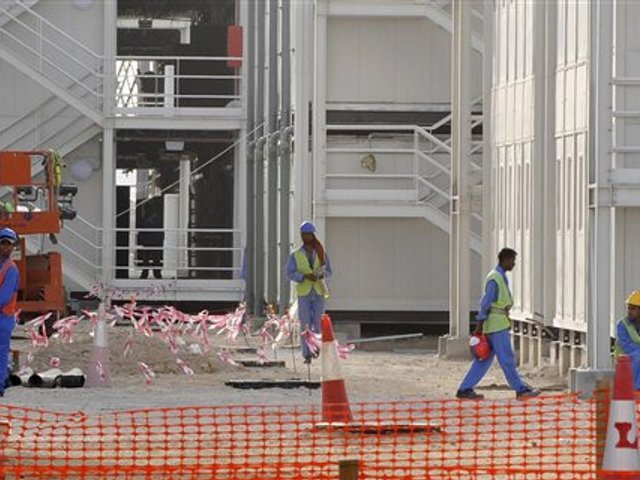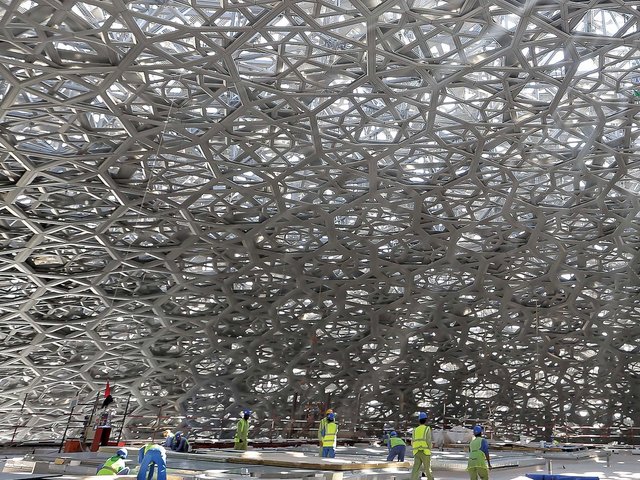Migrant workers building branches of the Guggenheim Museum, the Louvre and the Zayed National Museum on Saadiyat Island in Abu Dhabi continue to face crushing debt, substandard wages and harsh working conditions despite recent efforts to improve treatment, according to a report published this week by Gulf Labor, a coalition of artists and activists.
The report coincides with the release of The Gulf: High Culture/Hard Labor, a book of essays and art by dozens of contributors including the artists Hans Haacke, Thomas Hirschhorn, Naeem Mohaiemen and Andrea Fraser. The book, edited by the New York University professor Andrew Ross and published by OR Books, chronicles Gulf Labor’s five-year campaign. The book was created as part of the group’s contribution to the Venice Biennale this year.
Over the past year, Gulf Labor members travelled to Abu Dhabi and India to interview more than 50 workers. Although press reports often focus on living and working conditions on Saadiyat Island, the researchers found that “underpayment is far and away the primary concern” for the workers themselves. “Migrants come to the Gulf to earn as much as they can, and their grievances are sharpened when compensation is discounted and promises are broken, and when back pay and paid leave is denied outright.”
Most workers interviewed were paid less than $300 per month. On average, they estimated a fair wage for themselves would be $450 to $500, around 60% higher. Estimates of how much workers are paid also ranges widely based on “skills, seniority, ethnic differences, countries and region of origin.” Labourers from Bangladesh and Nepal “are generally worse off” than “most Indian or Pakistani migrants, and their average recruitment debt is significantly higher,” according to the report.
Nepal and India recently launched new efforts to minimise the financial burden on migrant workers. The Department of Foreign Employment in Nepal established a zero-cost migration policy this month, which demands written guarantees that the employer will cover airfare and visa costs. Last month, the Ministry of Overseas Indian Affairs launched an online portal that requires certain employers to outline the terms of work up front.
But Gulf Labor says it is unclear whether this transparency will mitigate the problems workers encounter once they arrive in the UAE. This spring, the local government denied entry to three members of Gulf Labor’s research team—Andrew Ross, Walid Raad and Ashok Sukumaran—“for security reasons”, according to officials.
Following high-profile demonstrations at the Guggenheim in New York and the Peggy Guggenheim Collection in Venice, the museum’s trustees agreed to meet with Gulf Labor members last month. They established “a joint commitment to work together on a set of common goals,” according to the report.
But the Guggenheim says that Gulf Labor’s report ignores meaningful progress. “Despite our concerted efforts, there is still a lack of understanding about the status of the Guggenheim Abu Dhabi project, refusal to acknowledge the nature of the Guggenheim’s role, and ignorance about the Guggenheim’s sphere of influence on matters outside of our control,” the museum says in a statement.
The Guggenheim says that “a building contract has not been awarded” for its Frank Gehry-designed facility and that Abu Dhabi’s Tourism Investment and Development Company (TDIC), the agency leading on Saadiyat Island’s museums and responsible for their construction, “has committed to selecting a general contractor of international standing and high integrity”. The museum says it has and will continue “to work closely” with the TDIC “to define measures for continuous enhancement” of worker conditions “within the framework of local regulations”.
Representatives from the Louvre and the TDIC did not immediately respond to a request for comment on the report.
Update, 4 August: Abu Dhabi's Tourism Development & Investment Company (TDIC) says in a statement that it “remains committed to ensuring the welfare of its workers on Saadiyat and to the delivery of its projects at the highest standards of integrity. This is being achieved by ensuring the appropriate legal framework is in place, through a regular and independent monitoring by a third party (PricewaterhouseCoopers) of the contractors’ employment practices and finally, with the continuous collaboration with our cultural partners.”
The organisation adds that Gulf Labor’s campaign references “inaccurate information to incite confusion”. With respect to the recruitment fees many migrant workers must pay, the TDIC says: “We would encourage Gulf Labor to focus its efforts by approaching the governments of the workers’ home countries to tackle the issue at its source.”



